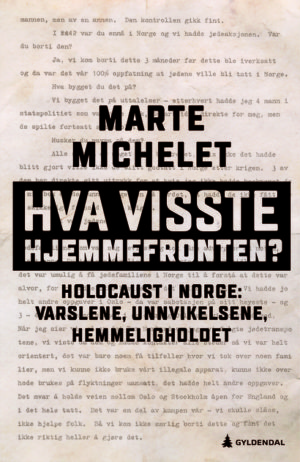Marte Michelet, whose latest book on Norway’s Holocaust infuriated descendants of wartime heroes, apologized during the weekend for mistakes that have been corrected in new editions. She staunchly defended, however, her exposure of how badly Jewish Norwegians were treated before, during and after the Nazi German occupation.

“Even though I made some mistakes during extensive work,” Michelet told newspaper Bergens Tidende (BT), she firmly stands by her second book on Norway’s Holocaust, entitled Hva visste hjemmefronten? (What did the Resistance know?). Both it and her first book have contributed to how Norwegians have again been confronted by one of the most painful chapters in their own modern history.
“It was very important to reveal what kind of treatment Jews in Norway were in fact subjected to,” she added, a reference to the anti-Semitic discrimination that was carried out not just by occupying Nazi forces but ordinary Norwegians as well.
Her second Holocaust book’s main revelation is that at least some members of Norwegian resistance forces and others knew in advance that Norway’s entire Jewish population would be rounded up and deported to Nazi concentration camps. Only a small portion of those who hadn’t already fled to Sweden survived, and came home to find their homes taken over and all their possessions gone. Another 60 years would pass before they received much if any compensation, and 70 before they began receiving official apologies.
Michelet, who has confronted her critics earlier, has been working on a more detailed written response to them. Critics have included historians who lashed out at her methods and, not least the children and grandchildren of Resistance members and those who helped some Jewish Norwegians flee over the border to Sweden. They have objected mightily to claims that they were more interested in profiting on the Jewish Norwegians than helping them.
‘Went too far’
On Friday she spoke with BT before taking part in a session of the Bergen International Literary Festival. She conceded that she “went too far” in suggesting that those leading Carl Fredriksens Transport at the time “were only driven by a profit motive when they helped Jews trying to escape the Nazis.” She also admitted to misinterpreting letters written by one of the transport firm’s leaders, and claims both errors have been corrected.
“There may be more corrections coming,” she added at the literary festival, as she continues to go through her own book point by point.

Perhaps her biggest mistake, she suggested, was in believing that enough years had passed since the war that her work wouldn’t spark such strong feelings. “I thought the necessary distance was there, that we could finally chip away at some of the war hero stories,” Michelet told BT. “I have been naive.”
She’s instead been subjected to a media storm of criticism that prompted three other historians to write their own book that tears apart hers, but also makes readers wonder why they never wrote their own books for a widespread audience about the subject. The harshest criticism came from the descendants of war heroes suddenly were cast in a poor light after decades of adulation. They even theatened to sue. The book’s publisher, Gyldendal, has stood behind Michelet, made changes in new editions and rejected calls from her critics to withdraw the book.
Michelet notes how she started working on Hva visste hjemmefronten? when she was wrapping up her first highly acclaimed book on Norway’s Holocaust. She was given a copy of a letter the late historian and Resistance member Ragnar Ulstein had written in 1978. In it, Ulstein wrote that “One of my sources, (Resistance hero) Gunnar Sønsteby, has claimed he received a message about the (Jewish deportation) around three months before it was carried out.” Sønsteby died in 2012 as Norway’s most highly decorated citizen.
Like most others, Michelet had thought the deportation came suddenly and without warning. Historians have also suggested that the Resistance forces did all they could to save Jewish Norwegians. Instead, Ulstein (who has since died as well) seemed to offer another version without ever writing about it himself.
Michelet also writes about anti-Jewish attitudes within the Resistance, the exiled Norwegian government in London, the illegal press and the state church at the time. She still believes that such attitudes contributed to the lack of more support for Jewish Norwegians. Years later, studies have shown that anti-Semitism has remained a problem in Norway.
Michelet continues to work on her response to the three historians who have publicly attacked her over the past several months. That’s due in an upcoming issue of the literary magazine Prosa. “I deeply disagree with their presentation of my book and the work I have done,” Michelet told BT, and I will reject very many of the charges they have made against me.”
NewsInEnglish.no/Nina Berglund

